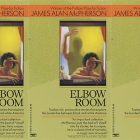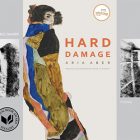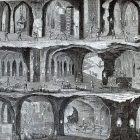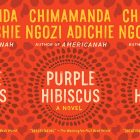Confronting the Archive in UPEND
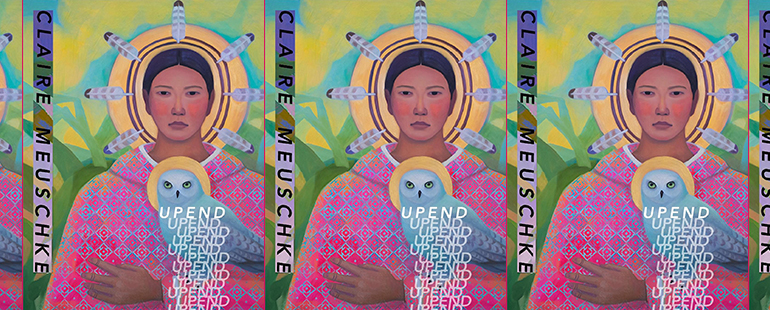
Claire Meuschke’s 2020 poetry collection, UPEND, brings together archival texts related to her family with poems that explore, contradict, and fill out that archive. Is poetry itself a type of archive? What relationship does poetry have to archival materials like newspapers, government documents, or even, as Meuschke uses, swatches of paint chips from Sherwin Williams? And what does the archive leave out (the book is dedicated “to my great-grandmother, who the archive elides”)? Meuschke’s collection explores these questions, and asks how such material and historical objects constrain and define our lives, and how we stretch beyond these constraints, or live in defiance of them.
Throughout the collection, Meuschke uses a variety of texts as an archive that the poems spring from, speak in response to, or grapple with. While some of these texts appear only once, she returns repeatedly to the transcript of her grandfather’s interrogation at his immigration trial, as well as to Sherwin-Williams paint swatches and their color names. The immigration trial transcript has been scanned and is printed whole across the pages of the book, and the paint swatches sometimes appear as actual swatches on the pages. The repetition of these two texts—sometimes referenced whole, sometimes only referenced or shown in part, such as a single paint color name, or the tiny symbol doodled on the immigration trial transcript by the translator—serve both to build cohesion throughout the text and also enhance the feeling of tension between past and present.
Her grandfather’s interrogation took place on August 2, 1912, but it haunts Meuschke’s present. “He won’t elaborate on bitterness and I don’t ask / how an island detainee’s scanned photocopied trial / becomes held and how as this cutting do I plant it,” she writes in the poem “Counter.” The Sherwin-Williams paint swatches are clearly contemporary, but the paint names themselves are dripping with the colonial, racist, genocidal past that has impacted Meuschke’s family: “Indian White 0035 / Chinese Red 0057…Well-Bred Brown 7027…Colonial Revival Tan 2828 / Colonial Yellow 0030 / New Colonial Yellow 2853.” These paint color names, which might be considered “neutral” terms when viewed in a paint store, become saturated with meaning when placed within Meuschke’s poems and her family archival materials. The reader is more than halfway through the collection before Meuschke reveals that her father was a house painter for a living, and that these were the paints he used. Meuschke’s careful curation of this archive and juxtaposition with her poetry shows that there is no neutral, nothing without a past, and that the past is alive within the present.
The choice to withhold information from the reader for a time is an interesting one. This withholding both mimics the ways that information was withheld from Meuschke (and continues to be unavailable in some cases), and puts the reader in a state of confusion or imbalance, which is only sometimes tipped into understanding. This technique is continued in poems such as “Diamond Scraps of Southeast Alaska, Northern California, Northwest New Mexico,” which begins,
Down the Frozen Yukon. Are No Longer Cannibals
The Alaska islands gen- erally are notable for their
wealth and variety of flowers and almost all of these are fragrant.
I can’t be apart from the times I can’t be a part of the times
Here, and later in the poem, sentences are interrupted by fragments from historical documents (sometimes appearing as whole sentences, sometimes not), which both add meaning and fracture meaning within the poem. Is this what the archive offers us? Layers of meaning and rupturing of meaning? If meaning gleaned from the archive can only be partial or interrupted, then how do we live beyond the archive, taking what we can from it? Meuschke seems interested in this question in poems like “Counter [2],” where she writes:
I dispossess
words stated:
California
Angel
Status
Alleged
Meuschke both embraces and refutes the archive, is entangled in it and stepping outside of it.
In the poem “Stunning Angel Island Fire Seen for Miles,” the timelines of past and present clearly collide with each other, Meuschke again using the archive to illuminate the collision:
The military planted 24 acres of eucalyptus that expanded to 86 and
invaded native plants.Chinese characters carved into a prison wall in the Immigration Station:
Once you see the open net, why throw yourself in? It is only
because of empty pockets I can do nothing else.
-UNKNOWNBefore historical; before conservationists; before the military;
before quarantine; before the Immigration Station—what systems did
the Miwok use for their livelihood? Livelihood; not survival.
Meuschke’s distinction between survival and livelihood is an important one. Her father painted houses for a livelihood. Her grandfather went through an immigration trial at Angel Island for survival. The concept of “before historical” is also resonant in a collection that is clearly very interested in history and its intersections with the present. As much as Meuschke is interested in history, she reminds us that history, or our record of it, is not all that is important. “Stunning Angel Island Fire Seen For Miles” ends with the lines, “A ferry ticket costs 15 dollars roundtrip. / Put coins in the cemented-down binoculars. See everything / except the place itself.” They feel like a potent reminder that as closely as we may examine a place, a record, an item in the archive, it is possible to see everything and still miss everything. That our examination is crucial, and also inherently flawed and limited.
Questions from her grandfather’s immigration trial resurface throughout the collection, emphasizing the obsessive quality of Mesuchke’s archive, and the ways the past still has its hold on the present (and future). These questions, which were used to try to determine the “validity” of immigrants on trial at Angel Island, are repeated in “Restrained Gold 6129,” this time with answers that seem nonsensical, perhaps to display the absurdity of the interrogation itself.
How many chickens did your family own?
Personal leave daysHow many fingers did your mother have?
Removal proceedingsWhat is your milk name?
VacancyWhat was your high school mascot?
To advance the missionWhat is your father’s middle name?
Uniform allowance
While the “answers” given in “Restrained Gold 6129” (another paint color name from Sherwin-Williams) seem absurd, they are also edged in violence veiled in bureaucracy, and are themselves part of the archive. UPEND is filled with questions we can’t stop asking or ever really answer. As Meuschke writes in the notes at the end of the collection, “Much of the language and driving force behind this book stems from the immigration trial of my grandfather. My brother, Gus Meuschke, an academic and artist, led us to the archive in 2012 and it has been haunting us ever since.”
The way UPEND is crafted, with both archival materials and poems engaging with those materials, allows it to explore and build the argument that neither poetry nor the archive are enough. Personal perspective and historical materials are both too narrow a lens by themselves. The binoculars are not only small tools to use if we want to see more than what is directly in front of us, they are also “cemented-down.” Meuschke presents us with tools for loosening the cement, using both the binoculars and our eyes.
